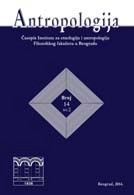Paradoks postkulturne antropologije.
Postmoderna teorija etnografije kao teorija kulture
THE PARADOX OF POSTCULTURAL ANTHROPOLOGY
Postmodern theory of ethnography as a theory of culture
Author(s): Miloš MilenkovićSubject(s): Customs / Folklore, Structuralism and Post-Structuralism, Cultural Anthropology / Ethnology, Culture and social structure
Published by: Институт за етнологију и антропологију
Keywords: policy of anthropology; education; multiculturalism; tolerance; postcultural anthropology; theory of culture; history of anthropology; concept of culture; postmodern anthropology;
Summary/Abstract: The multiculturalization of higher education, of the public sphere and of overall political map of society has come to presume multiculturalism as a political, cultural and educational strategy, but this strategy has to be founded on some sort of image of a multicultural society. If we, the anthropologists, fail to offer one, we will remain irrelevant. But if we do, we will contradict ourselves. In this monograph study, I continue to reflect on this tricky but instrumentally fertile situation, and work on the paradoxical position in which anthropology, as a form of discourse directed at fighting culturally-generated inequalities, would have to accept the rehabilitation of the concept of culture against which it has developed for decades, and whose employment generously stimulates the perpetuation of the very same inequalities against which anthropology emerged as a form of cultural criticism. Anthropology around the Millennium cannot intervene in the social reality as cultural critique and multicultural propaedeutics unless it renounces its 20th-century theoretical and methodological heritage. In the second half of the 20th century, anthropology developed in opposition to the traditional anthropological concept of culture as a relatively stable and homogenous system of values, acts and beliefs, which characterize a group or a community. However, this concept is still widely employed in political theory, multicultural policies and public discourses, and this implicit theory of culture will probably survive despite the valid reasons anthropology has offered in favor of abandoning it as an essentialist construct that is epistemologically naive and politically fatal. If it strives to intervene in those policies, anthropology would have to renounce its postcultural status, and sacrifice its image as a theoretical discipline, in order to endure the game of intervention of social and political theory in the ongoing processes of multiculturalization of education, political systems, and public sphere. On the other hand, by sacrificing the image of a highly sophisticated theoretical discipline, anthropology might lose the authority on the basis of which it gets the opportunity to intervene on the process of negotiation and decision-making concerning contemporary life.
Journal: Antropologija
- Issue Year: 7/2007
- Issue No: 1
- Page Range: 121-143
- Page Count: 23
- Language: Serbian

